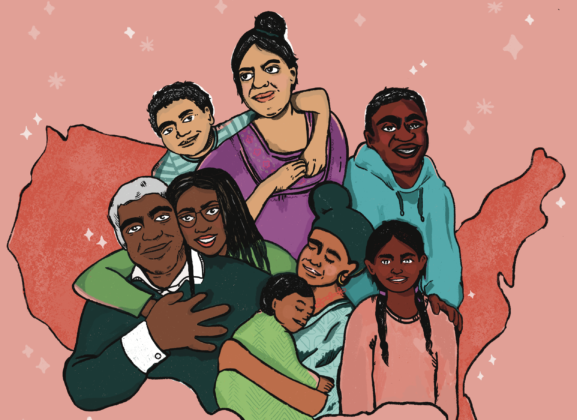Embracing Our Strengths: How to Support Immigrant Families in Every U.S. State
Embracing Our Strength is a two-part, immigrant-designed and immigrant-led project meant to address the needs of undocumented and mixed-status immigrant families through state policy recommendations.
View this page in: Haitian Creole | Spanish
Embracing Our Strength is a two-part, immigrant-designed and immigrant-led project meant to address the needs of undocumented and mixed-status immigrant families through state policy recommendations. The project includes two major components:
Our Voices, Our Policy: Recommendations of Immigrant Parents
View the Executive Summary in: Haitian Creole | Spanish
Next100 and Haitian Bridge Alliance, in partnership with ImmSchools, brought together Haitian Creole and Spanish speaking immigrant parents in mixed-status and undocumented families in California, Florida, New York, and Texas. We wanted to better understand the support that they and their families need within their states across four issue areas: education, health care, livelihood, and safety. The systemic exclusion of immigrants, particularly those who are undocumented, means that their voices are critical to drive the urgency for change and broadly envision what a supportive policy landscape should look like. Based on the conversations, we propose a guiding framework of policy recommendations across the topics discussed and cross-cutting guidance that will enable states to address the needs of immigrant families, thus protecting the potential of children of immigrants. The conversations with parents resulted in a report that uplifts the strengths of immigrant families, presents the challenges these families face, and shares recommendations for addressing those challenges.
Mapping State Policies to Support Immigrant Families
View this page in: Haitian Creole | Spanish
Concurrently, Next100 conducted an extensive state-by-state analysis of policies to support undocumented and mixed-status families across the same four issue areas (education, health care, livelihood, and safety) to identify opportunities for systemic action. This analysis tracks whether fifteen state-level policies (“policy indicators”) have been adopted by each state in the United States and notes variations within the policies. The analysis culminates in an interactive map scoring every state on how inclusive their policy landscape is of immigrant families regardless of immigration status.
Why We Did This Project
Collectively, these are envisioned as tools for state advocates, policy makers, and grassroots organizations to keep pushing for the environments we know all our neighbors deserve, regardless of immigration status. Next100 chose to look to state policy specifically as an exercise in hope and a practice in reality. There are eleven million undocumented immigrants living within and contributing to every state throughout the United States. They are among the essential and frontline workers keeping our country moving during this pandemic. They are raising a critical portion of our country’s children. They have an important stake in their communities’—and our country’s—future and collective well-being. And yet, many of them currently have no pathway to citizenship or opportunity to adjust their immigration status, which can only come at the federal level. Across the past three decades, undocumented immigrants have seen paths to citizenship narrowed at the federal level, as they are increasingly targeted and criminalized. Federal policy has consistently failed immigrant communities. Addressing that concern is necessary, and recent proposals by the Biden administration have renewed this possibility.
However, federal action on immigration has a challenging road ahead and is unlikely to solve every problem. Immigrant families cannot hold their breath until that hope becomes reality. Immigrants are impacted by policy across every issue, every day. Their future is affected by whether they are included consistently in the policy solutions our government implements to care for individuals in our country, or excluded and erased systematically. They face the real and tangible effects of state policy on a daily basis, and their well-being hinges on whether such policy includes and uplifts its immigrant community, or excludes and marginalizes them.
Charting a better path toward access to critical programs and services for immigrants, regardless of immigration status, is possible for every state. It starts with understanding the urgency for change, grounded in the actual experiences and priorities of the people living with the impacts of being undocumented every day. It must be informed by what has already been accomplished by other states. Marrying these two—the priorities of immigrant families, with a knowledge of the policy infrastructure that can and must support them—is how we will make not just forward progress, but the right progress. It’s time to embrace our strength. That strength includes all of our immigrant families. Our present and our future is interconnected. We need everyone to have access to the education, health care, livelihood, and safety to ensure we reach our full potential. We are stronger together.
State Recommendations for Improving Support of Immigrant Families
Download PDF here.
There are many concrete policy actions states can take to support immigrant families now, regardless of immigration status. Below is a list of the most important policies for states to consider, broken down into the categories of education, health care, livelihood, safety, and equity.
To improve education for immigrant families, states must do the following:
- Develop a diverse multilingual educator workforce by broadening teacher pipelines, including by offering tuition assistance to high school English learners (ELs) and former ELs who want to become bilingual educators, and by prioritizing pathways to teacher certification and financial support for the local community members who are already supporting schools as paraprofessionals or parent mentors.
- Require that all school personnel receive preparation and professional development that equips them to serve the children of immigrants, including on language acquisition and development, trauma-informed teaching practices with an immigrant lens, the rights of immigrant students and families in schools, and how to engage with students and families from an asset-based perspective.
- Dismantle the barriers to higher education for undocumented youth by implementing tuition equity at state universities and allocating funds for in-state financial aid and state loan programs so that students and families can pay for a higher education.
- Ensure high school educators and guidance counselors can support all students, including immigrant students, in their transition to higher education by requiring professional training on how to enroll in, finance, and navigate higher education for undocumented youth, the children of undocumented immigrants, and first-generation students.
- Expand economic mobility by removing barriers to professional licensure and certification across careers to all qualified applicants by removing citizenship, lawful presence, and social security number requirements in state law.
- COVID-19 pandemic response: Prioritize and protect funding for English learners and children of immigrant backgrounds by providing clear guidance to districts on the expenditure of related emergency funding to support these students.
To improve health care for immigrant families, states must do the following:
- Make state-subsidized health care coverage, including both physical and mental health support, accessible to every adult and child by ensuring eligibility does not require a social security number or a predetermined length of time in the United States, and that affordable premiums are offered on a sliding scale aligned with household income and local cost of living.
- Require that health care providers receive training on effectively serving immigrant communities, including on how to address barriers to health care for immigrant communities, engage effectively with immigrant communities, and understand the health care services and programs individuals can access regardless of immigration status.
- COVID-19 pandemic response: Mandate that any COVID-19 related illness or condition be covered under emergency Medicaid, and take affirmative steps to ensure the COVID-19 vaccines are accessible to all by not requiring proof of identity or asking for a social security number at any point in booking appointments, or if proof is required, accepting a variety of easily accessible documents to prove identity; and ensure language accessibility in each of the state’s major represented languages across all outreach and appointment booking strategies and modalities.
To improve livelihood for immigrant families, states must do the following:
- Protect all workers from workplace discrimination and wage theft by implementing stronger legal protections, stricter penalties, and increased enforcement capacity against workplace violations; funding worker centers and community organizations to conduct worker rights training; and requiring employers to participate in training on the rights of all workers regardless of immigration status.
- Issue driver licenses and state and local identifications that do not require a social security number for eligibility. These state identifications should include privacy provisions to protect applicant information from being sold to outside entities or shared across government agencies without court subpoenas or judicial warrants.
- Support expanded access to financial and banking services for individuals by requiring banks to accept any form of state identification and individual taxpayer identification numbers (ITIN) when opening bank accounts; making policies clear and accessible, including linguistically accessible, for immigrant communities; and creating lending programs that allow borrowers to use ITINs for students and families seeking college loans or home mortgages.
- Remove requirements that mandate employer use of E-Verify and limit voluntary employer use of the program.
- COVID-19 pandemic response: Ensure all workers receive financial relief by ensuring state pandemic relief programs, state earned income tax credits, and emergency economic support do not require a social security number for eligibility, and by creating excluded worker relief funds to address gaps in unemployment insurance.
To improve safety for immigrant families, states must do the following:
- Create universal legal representation programs that partner with and leverage existing immigrant-serving organizations, university-based legal clinics, and other community resources to ensure immigrants residing in the state have access to a lawyer in immigration courts, including when the immigration court is in another state.
- Prohibit local law enforcement from partnering with federal immigration enforcement entities by issuing directives or passing legislation that limits the sharing of data between law enforcement and immigration enforcement, forbids law enforcement from honoring ICE detainers, bans ICE from interrogating people held in jails, prohibits law enforcement from asking about immigration status, and ends local 287(g) agreements.
- Ensure misdemeanor sentencing laws do not result in disparate punishment for immigrants by limiting misdemeanor sentencing to 364 days or less.
- COVID-19 pandemic response: Slow the spread of the virus in detention facilities by issuing a moratorium on ICE transfers and requiring local law enforcement to reject ICE detainer requests and release people to their homes and families.
Ultimately, we must consistently craft more inclusive policy. States can ensure equity-driven policy that protects immigrant potential by doing the following:
- Establish a formal, state-level office for immigrant priorities, tasked with offering recommendations for protecting immigrants, centralizing efforts for policy implementation, ensuring policies meant to serve immigrants are implemented correctly and tracked to evaluate impact, and serving as a vehicle for immigrants to report or address instances of discrimination without fear of retaliation.
- Equip immigrants to lead policy-making efforts by partnering with and funding direct-service organizations to ensure diverse immigrant voices are consistently consulted and surveyed when crafting recommendations and reviewing implementation and outreach efforts.
- Center racial justice by investing in community-based public safety solutions, disentangling criminal law enforcement from civil immigration law enforcement, and disaggregating misdemeanor and felony sentencing data by race, country of origin, and form of legal representation to provide a clearer picture on institutional issues disproportionately affecting Black immigrants.
- Foster an equitable and welcoming environment for all immigrants by publicly uplifting the contributions and impact of immigrant communities, earmarking funds for outreach to immigrant communities in rural and under-resourced areas throughout the state, and enabling language access by ensuring multilingual resources are available in all major languages represented by populations within the state.
Acknowledgments
First and most importantly, we are indebted to the immigrant parents who opened their fearless hearts and shared their brilliant minds with us. In an environment where it’s hard to trust, you trusted us with your stories and ideas for the future. We are stronger for your voices and contributions. Without you there is no us.
To the partners in the work: WOW. Without you, none of this would have been possible. Haitian Bridge Alliance, your partnership, flexibility, and dedication to seeing this project through from beginning to end was invaluable. May we all take a page out of your solidarity playbook and learn that commitment to expanding the narratives of our immigrant community and explicitly making a call for racial justice within the work is not only possible, it is necessary. Thank you to ImmSchools for embracing this project and sharing your strong relationships with families to allow us to engage in important conversations around impacting state policy. Thank you for being fearless in creating safe spaces for undocumented immigrant students and families. Respond: Crisis Translations, thank you for your critical work on language access. Because of you, the culminating products of this project are accessible for the original intended audience—immigrant parents—in real time.
Next100 and The Century Foundation, talk about a group effort. Thank you for the back and forth, countless hours of feedback on every piece at every step of the way, and all you poured into supporting this project and making it a reality. The TCF editorial team, the TCF communications team, Conor, and Dan, thank you for the patience as I figured it out and the quick turnaround on everything. Emma, thank you for the trust.
Beyond our formal partners, this work was shaped by the powerful insight of social justice warriors across movements and years. Logan Casey and the Movement Advancement Project were exceedingly helpful through the expertise they have gained from a decade of work capturing the policy landscape for LGBTQ individuals through their Equality Maps. At the Center for Law and Social Policy, Wendy Cervantes, Vanessa Meraz, and Rosa Garcia shared thoughtful feedback on the indicators affecting immigrant families and extended introductions to additional experts. They have created the structures for collective impact through the Children Thrive Action Network, necessary to sustaining and making progress on the work of ensuring immigrant children and families are never an afterthought. Tatyana Kleyn with CUNY IIE dug right into the indicators and shared extensive feedback on where there was opportunity for more and what we needed to dig into through her expertise in ensuring educators are prepared to support immigrant students and families. Hamutal Bernstein and Cary Lou with the Urban Institute, Heather Koball and Joe Stinson with the National Center for Children in Poverty, David Kallick with the Fiscal Policy Institute, Erica Williams and Eric Figueroa with the Center for Budget and Policy Priorities, Tanya Broder with the National Immigration Law Center, Nicole Svajlenka at the Center for American Progress, and Daniela Alulema at the Center for Migration Studies (among many, many more) have dedicated years of research to the policies affecting immigrants and ways immigrants contribute to their communities. Thank you for the generosity in our conversations and the radiance of your work.
Thank you to the undocumented immigrant youth movement for being the first to teach me that my voice mattered and inculcating in me the importance of extending that to others. In particular the New York State Youth Leadership Council, Momentum Alliance, UndocuBlack, and United We Dream, you all continue to inspire me for challenging unhelpful narratives; urgently demanding dignity, justice, and inclusion for our undocumented community; and pushing to always make more room at the table for meaningful engagement.
—Rosario






